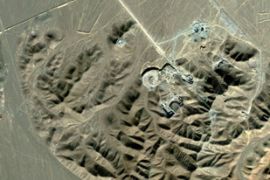IAEA censures Iran over atomic site
UN nuclear watchdog rebukes Tehran over secret development of uranium enrichment site.

The White House said after the vote to censure Iran that Tehran must soon convince other countries that its nuclear programme is not geared towards building a weapon.
“Our patience and that of the international community is limited, and time is running out,” Robert Gibbs, the White House spokesman, said.
“If Iran refuses to meet its obligations, then it will be responsible for its own growing isolation and the consequences.”
The move received rare Russian and Chinese backing but it was unclear whether the measure would translate into support from Beijing and Moscow for further sanctions that Western leaders may push for if Iran does not begin to dispel concerns about its nuclear ambitions soon.
Most developing nations on the IAEA board opposed the resolution, which was sponsored by Britain, France, Germany, China, Russia and the United States, saying it would be provocative and counterproductive.
‘Serious concern’
The resolution criticises Iran for defying a UN Security Council ban on uranium enrichment and rebukes it for secretly building a uranium enrichment facility near the city of Qom.
| in depth | |||||||||||||||||||||||
|
Ali Asghar Soltanieh, Iran’s envoy to the IAEA, said that the resolution was “hasty and undue” step.
“This resolution will of course damage the existing environment of co-operation with the IAEA,” he said.
Alireza Ronaghi, Al Jazeera’s correspondent in Tehran, said that the resolution comes as Iran’s government faces pressure from its supporters inside the country to be forthcoming in its negotiations with the world powers over exchanging enriched uranium.
Ronaghi was referring to an IAEA-brokered plan to provide Iran with fuel for a nuclear medicine reactor in exchange for enriched uranium that could be turned into bomb material if further refined.
“Iran’s economy has been under pressure for almost four years, since President Ahmadinejad took power and immediately adopted some very aggressive policies in Iran’s nuclear programme,” Ronaghi said.
“It is not going to be easy to handle any more sanctions from now on. I’m sure it is going to be a very serious concern among members of Iran’s ruling elite.”
Secret site
Massoumeh Torfeh, a research associate at the School of Oriental and African Studies in London said that while Iran will not like the fact that China and Russia backed the resolution, it was important not to put “too much value on that”.
“I think at this stage, when it is just a matter of condemnation and a freezing of action inside Iran near the Qom plant, I think it is easy for Russia and China to agree. When you come to sanctions, it will have them reverting back to the previous position,” she said.
Mohammad Marandi, a professor at the University of Tehran’s Institute of North American and European studies, said that Iranian diplomatic offers made to the P5+1 – the five permanent members of the UN Security Council and Germany – had been ignored by Western countries.
|
“The Iranians feel that there was an opportunity for co-operation but that the Western countries chose not to pursue that path” Mohammad Marandi, a professor at the University of Tehran’s Institute of North American and European studies |
“The Iranians a few weeks ago had negotiations with the five plus one that went somewhat well. Then the Iranians themselves had their own initiative – an offer to purchase uranium enriched at 20 per cent, instead of producing it itself. Then the West began making unreasonable demands.
“The Iranians feel that there was an opportunity for co-operation but that the Western countries chose not to pursue that path.”
Supporters of the resolution were provoked by the revelation in September of the site, which Iran had been building for at least two years.
The discovery of the site has fuelled suspicions among Western states that Iran could be building other covert facilities dedicated to the making of nuclear weapons.
The resolution notes that the IAEA cannot confirm that Tehran’s nuclear programme is exclusively geared towards peaceful uses and expresses “serious concern” that Iran may be hiding a military nuclear program.
On Thursday, Mohamed ElBaradei, the director-general of the IAEA, said an investigation into whether Iran was seeking to build nuclear weapons had reached “a dead end”.
ElBaradei expressed dismay over Iran’s failure to notify the IAEA of the site near Qom and said that Tehran’s initial failure to notify the agency of the existence of the plant “was inconsistent with its obligations”.
Tehran says the bunkered Qom site, which is to start operating in 2011, is a backup for its much larger Natanz enrichment centre in case it is bombed by foes such as Israel.
Western nuclear analysts say Qom’s low capacity makes it unsuitable for any purpose but to enrich smaller quantities of uranium suitable for a bomb.
Enrichment plants generally need tens of thousands of centrifuges to feed a nuclear power plant.
